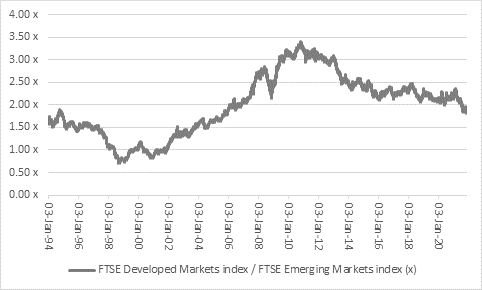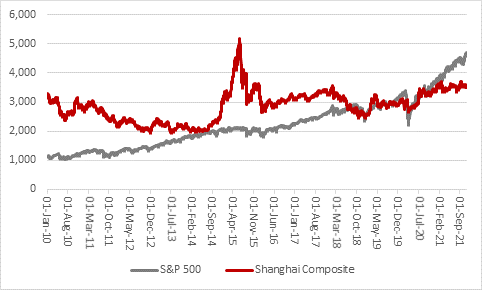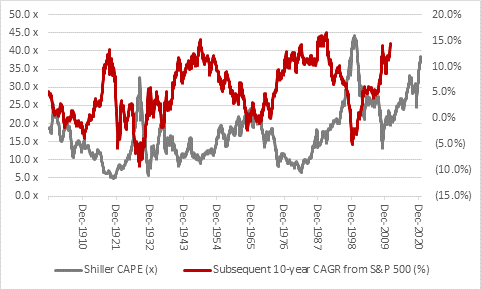“Gordon Gekko, the insider-trading corporate raider of 1987’s Oliver Stone film Wall Street, may have been a villain but that did not stop him talking a degree of sense, especially as he warned quite clearly ‘The mother of all evil is speculation,’” says AJ Bell Investment Director Russ Mould. “Quite what Gekko would have made of today’s markets can itself be only a source of guesswork, but he would have surely blanched at the price tag now afforded to electric vehicle maker Rivian and the bubbly nature of many stocks and even entire asset classes.
“A $100 billion-plus market cap for such a young company as Rivian Automotive offers little or no downside protection should anything unexpected go wrong, whereas investors can potentially find a better balance between downside protection and upside potential by seeking out something which may be unloved and therefore undervalued.
“In this context, the last ten years’ underperformance by emerging market equities relative to developed one catches the eye.
“This can be seen by simply dividing the value of the FTSE Emerging by that of the FTSE Developed Index. If the line rises, Emerging Markets are outperforming and if it falls then Developed arenas are doing better.

Source: Refinitiv data
“Developed Markets ended the 1990s on a high as the Asian and Russian currency and debt crises hammered Emerging Markets, only for them to recover just in time for the technology bubble bust to hobble the Developed ones for the best part of a decade. It has been one-way traffic since 2010, however, as Developed Markets have proved to be the better portfolio pick by far.
“The questions to ask now, therefore are ‘why?’ and ‘what could change’?
“One good guess as to the reason for the performance disparity would be the sector mix of the indices. But they are not as different as investors might think. There is a similar representation in technology and the percentage weighting toward cyclical sectors such as financials, industrials and consumer discretionary. Emerging markets’ greater weighting toward financials in a margin-crushing, zero-interest-rate environment may not help, and nor may the higher weighting toward energy and basic materials (mining) during a low-growth, low-inflation decade, but neither looks conclusive.
|
FTSE Developed index |
Weighting |
|
FTSE Emerging index |
Weighting |
|
Technology |
23.8% |
|
Technology |
24.5% |
|
Industrials |
18.7% |
|
Financials |
20.9% |
|
Financials |
13.7% |
|
Industrials |
12.5% |
|
Consumer Discretionary |
12.4% |
|
Consumer Discretionary |
10.9% |
|
Healthcare |
12.0% |
|
Energy |
7.4% |
|
Consumer Staples |
5.7% |
|
Consumer Staples |
5.9% |
|
Energy |
3.5% |
|
Basic Materials |
4.6% |
|
Telecoms |
3.0% |
|
Healthcare |
4.2% |
|
Real Estate |
2.9% |
|
Telecoms |
3.9% |
|
Utilities |
2.8% |
|
Utilities |
2.7% |
|
Basic Materials |
1.5% |
|
Real Estate |
2.5% |
Source: FTSE Russell as of 29 October 2021
“A more convincing explanation comes in the form of geographic exposures. The runaway US equity market represents two-thirds of Developed market capitalisation and China more than one-third of that of Emerging Markets.
|
FTSE Developed index |
Weighting |
|
FTSE Emerging index |
Weighting |
|
USA |
66.1% |
|
China |
38.0% |
|
Japan |
7.2% |
|
India |
14.9% |
|
UK |
4.4% |
|
Taiwan |
16.8% |
|
France |
3.1% |
|
Brazil |
5.1% |
|
Canada |
2.8% |
|
Saudi Arabia |
3.9% |
|
Germany |
2.6% |
|
South Africa |
3.8% |
|
Australia |
2.2% |
|
Russia |
3.8% |
|
Korea |
1.6% |
|
Thailand |
2.3% |
|
Netherlands |
1.5% |
|
Mexico |
2.3% |
|
Sweden |
1.1% |
|
Malaysia |
1.9% |
|
Other |
7.7% |
|
Other |
7.3% |
Source: FTSE Russell as of 29 October 2021
“This is not the only reason – China’s weightings have increased over time as overseas listings and the domestically-traded stocks have entered global indices – but the S&P 500 is up by more than 300% since January 2010 and the Shanghai Composite by just 7%, but it could well be a factor.

Source: Refinitiv data
“After a long and loud clamour for their inclusion, index compilers are now busily excluding Chinese stocks owing to US sanctions, governance issues and more besides. That may appeal to contrarians, who will also baulk at the valuation attributed to US stocks.
“The Case-Shiller cyclically adjusted price earnings (CAPE) ratio is no use at all as a near-term timing tool.
“But the two previous occasions when the CAPE exceeded 30 times, and the four prior times when ten-year historic compound returns from the S&P 500 have exceeded 10%, have all seen the next decade’s returns from US equities tail off very badly indeed.

Source: http://www.econ.yale.edu/~shiller/data.htm
“Some investors will be happy to stick to the maxim that ‘the trend is your friend’ and row in with the US and Developed Markets over China and their Emerging counterparts. Others will keep the combination of Gordon Gekko and Shiller’s CAPE in mind.
“Granted, China is trying to support its economy while managing a huge debt mountain and trying to stop financial speculation from derailing its economy through poor capital allocation.
“But you can argue the US faces the same challenge, even if it comes with far superior corporate governance and investor protection.
“China is acting and could be running monetary policy that is too tight as a result. That leaves it room to loosen.
“The Federal Reserve might just be ducking the challenge and running policy that is too loose, with the result it will have to tighten in time whether it likes it or not. Such a reversal of fortune could, one day, break a ten-year-plus trend in relative share price performance and even create upset in names such as Rivian Automotive, where a company-specific event or wider market dislocation could leave its valuation looking very exposed.
“Rivian’s $100-billion-plus market cap is more than that of rival (and backer) Ford, even though Ford is forecast by analysts to generate more than $120 billion in sales and nearly $6.5 billion in net profits in 2021. By contrast, Rivian is going to be in loss this year, not least as it only began to ship its first vehicles in September.
“Whatever investors think of Rivian’s potential, its valuation now prices in an awful lot of good news and not much bad. This is not to say anything bad will happen. But if it does, the valuation offers little or no downside protection - even if those who bought at the IPO could counter that they do not care, given the surge from the $78-a-share offer price.”
